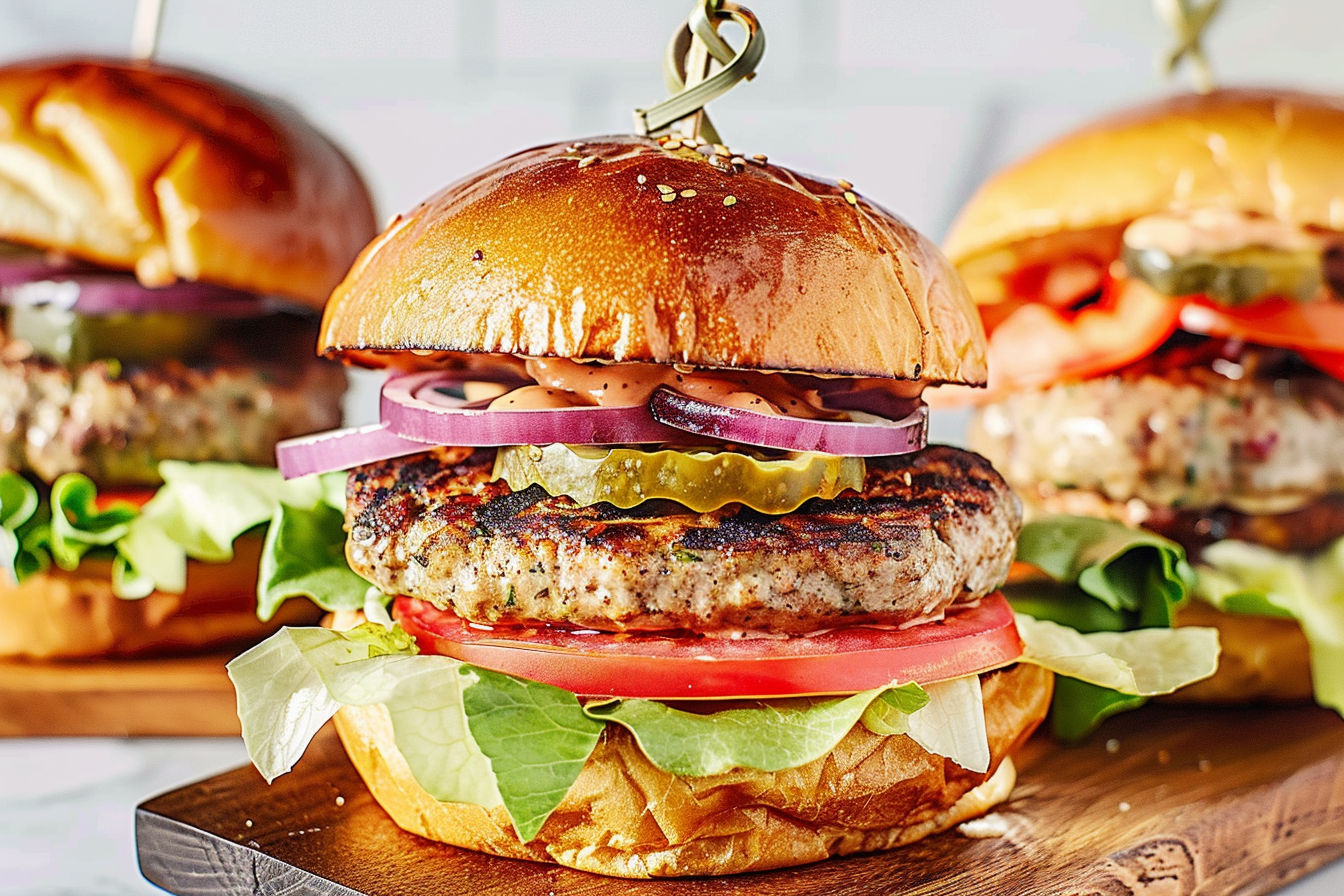Turkey burgers are a delicious and healthier alternative to traditional beef burgers, offering a leaner option without sacrificing flavor. This Turkey Burger Recipe is easy to make and can be customized with your favorite toppings for a satisfying meal that the whole family will enjoy.
Why Make This Recipe
Making turkey burgers is a great way to mix up your burger game and enjoy a lighter option that’s still packed with flavor. Ground turkey is a lean protein source that pairs well with a variety of seasonings and toppings, making it a versatile and tasty choice for a quick and easy meal.
How to Make Turkey Burger
Ingredients:
- 1 lb 93% lean ground turkey
- 1/4 cup seasoned whole wheat breadcrumbs (or gluten-free breadcrumbs)
- 1/4 cup dried onion flakes
- 1 tablespoon ketchup
- 1 tablespoon mustard
- 1 teaspoon Worcestershire sauce
- 1 clove garlic (grated)
- 1 teaspoon kosher salt
- Olive oil spray
- 4 burger buns
- Cheese
- Sliced tomato
- Sliced red onion
- Iceberg lettuce
- Sliced pickles
- Ketchup and mustard
- Caramelized onions
- Avocado
Directions:
- In a bowl, mix together ground turkey, breadcrumbs, onion flakes, ketchup, mustard, Worcestershire sauce, garlic, and salt until well combined.
- Divide the mixture into 4 patties and place them on a plate.
- Heat a grill or skillet over medium heat and spray with olive oil.
- Cook the turkey burgers for about 5 minutes on each side, or until they reach an internal temperature of 165°F.
- Serve the cooked burgers on buns with cheese, tomato, onion, lettuce, pickles, ketchup, mustard, caramelized onions, and avocado.
How to Serve Turkey Burger
Serve the turkey burgers hot on buns with your favorite toppings and sides like sweet potato fries, coleslaw, or a side salad. Enjoy them at a summer barbecue or for a quick weeknight dinner.
How to Store Turkey Burger
Store any leftover cooked turkey burgers in an airtight container in the refrigerator for up to 3 days. Reheat them in the microwave or on the stovetop before serving.
Tips to Make Turkey Burger
- Don’t overmix the turkey burger mixture to avoid a dense texture.
- Make sure to cook the burgers to an internal temperature of 165°F to ensure they are fully cooked.
- Add a splash of Worcestershire sauce for an extra boost of savory flavor in the burger patties.
Variation
For a spicy kick, add some chopped jalapeños or cayenne pepper to the turkey burger mixture. You can also experiment with different cheese options or swap the traditional burger bun for a lettuce wrap for a low-carb option.

Turkey Burger Recipe
Description
Make these delicious and healthier turkey burgers for a satisfying meal that the whole family will enjoy. Customize with your favorite toppings and serve them hot for a classic burger experience with a twist.Ingredients
Turkey Burger Patties
Toppings and Sides
Directions
-
Step 1
In a bowl, mix together ground turkey, breadcrumbs, onion flakes, ketchup, mustard, Worcestershire sauce, garlic, and salt until well combined. -
Step 2
Divide the mixture into 4 patties and place them on a plate. -
Step 3
Heat a grill or skillet over medium heat and spray with olive oil. -
Step 4
Cook the turkey burgers for about 5 minutes on each side, or until they reach an internal temperature of 165°F. -
Step 5
Serve the cooked burgers on buns with cheese, tomato, onion, lettuce, pickles, ketchup, mustard, caramelized onions, and avocado.
Nutrition Facts
Servings 4
- Amount Per Serving
- Calories 300kcal
- % Daily Value *
- Total Fat 13g20%
- Saturated Fat 4g20%
- Cholesterol 80mg27%
- Sodium 700mg30%
- Potassium 350mg10%
- Total Carbohydrate 20g7%
- Dietary Fiber 2g8%
- Sugars 5g
- Protein 25g50%
- Vitamin A 10 IU
- Vitamin C 8 mg
- Calcium 6 mg
- Iron 15 mg
- Vitamin D 2 IU
- Vitamin E 4 IU
- Vitamin K 2 mcg
- Thiamin 10 mg
- Riboflavin 15 mg
- Niacin 20 mg
- Vitamin B6 10 mg
- Folate 15 mcg
- Vitamin B12 6 mcg
- Biotin 2 mcg
- Pantothenic Acid 8 mg
- Phosphorus 20 mg
- Iodine 4 mcg
- Magnesium 6 mg
- Zinc 15 mg
- Selenium 10 mcg
- Copper 2 mg
- Manganese 4 mg
- Chromium 3 mcg
- Molybdenum 1 mcg
- Chloride 3 mg
* Percent Daily Values are based on a 2,000 calorie diet. Your daily value may be higher or lower depending on your calorie needs.

